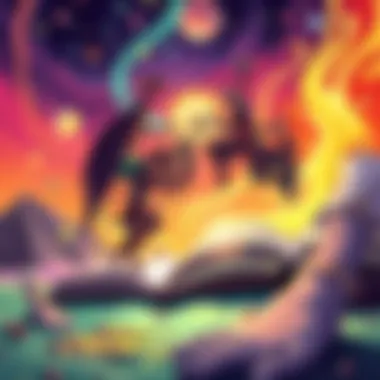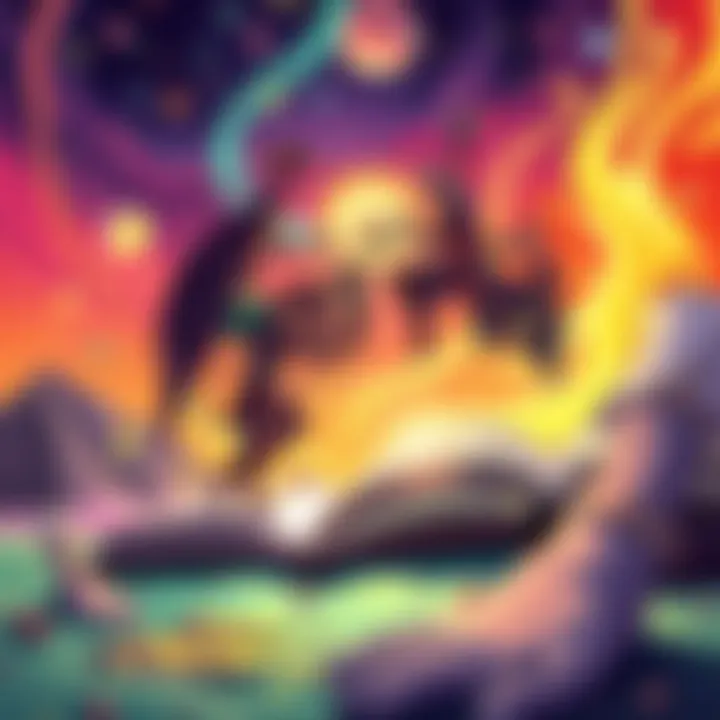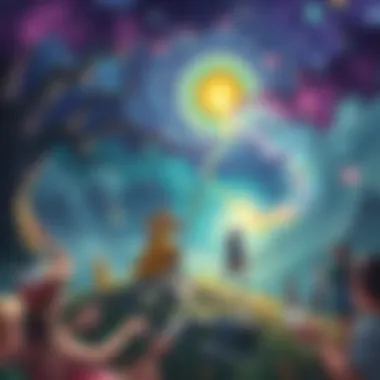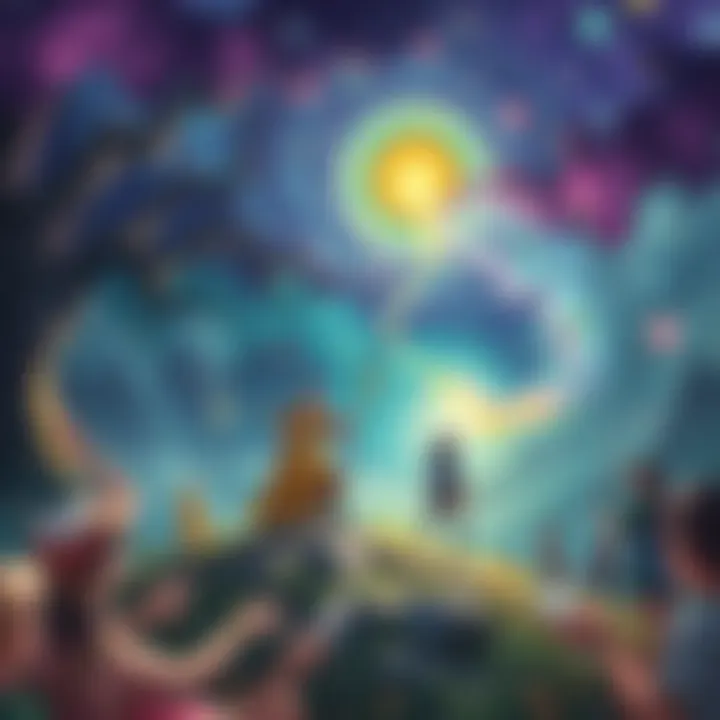Exploring Joseph Campbell's Insights on Mythology


Intro
Joseph Campbell, a figure whose influence stretches far beyond academic circles, invites us to take a deeper look into the narratives that define our lives. His work reveals how mythology, in its many forms, is interwoven with culture, identity, and personal evolution. Campbell argues that myths provide a lens through which we understand the world, offering valuable insights into both our collective humanity and our individual journeys.
In a time when many search for meaning in a rapidly changing society, Campbell's ideas resonate. Through lenses of the hero’s journey and universal themes, he elucidates how these age-old stories shape not just individual lives, but also communities. The journey to find or create meaning often mirrors the trials faced by heroes in myths—a tale as old as time itself.
This piece aims not just to unpack Campbell's contributions to the world of mythology, but to illustrate their relevance today. By understanding the role of myth, readers may uncover a greater comprehension of their life paths, cultural intersections, and shared experiences. As we firstly explore these concepts, perhaps you'll see a reflection of your own story amidst the countless myths that have traversed time and space.
Categories of Life-Changing Books
- Self-Help and Personal Development
- Fiction with Transformative Themes
In these categories, we find gems that echo Campbell's philosophies. Self-help books often draw from mythological themes, showing us that overcoming adversity is a universal pursuit. Narratives in fiction help to illustrate transformative experiences that resonate with readers on a personal level. Just as Campbell highlights, every story, whether rooted in myth or modern-day struggles, teaches us about ourselves and our places in the world.
Look at books like The Alchemist by Paulo Coelho, which offers a modern take on a hero's journey, or Man's Search for Meaning by Viktor Frankl, which dives deep into existential questions and resilience. Each serves as a compass for personal exploration in a world that can often feel aimless.
As we delve deeper, we will encapsulate key themes and insights from Campbell’s work, revealing how they can be woven into the fabric of our daily lives, enriching our understanding of ourselves and the broader human experience.
"Myth is the secret opening through which the inexhaustible energies of the cosmos pour into the human cultural manifestation." - Joseph Campbell
This quote perfectly encapsulates how myths serve to connect us to something greater than ourselves, positioning us within a narrative that transcends time. By drawing from Campbell's insights, we ultimately begin to appreciate the rich tapestry of life that these stories represent.
Understanding Joseph Campbell
In the realm of mythology, few names resonate as deeply as that of Joseph Campbell. His exploration into ancient narratives and collective unconscious has not only shaped academic discourse but also appealed to a broad audience fascinated by the significance of myths in our lives. Understanding Campbell's work provides profound insights into how myth acts as a compass guiding the human experience across various cultures and time periods.
One of the critical elements in grasping Campbell's contributions is recognizing his central tenet: myths are not merely tales spun from the imagination. They serve an essential purpose in tethering individuals to their cultural heritage, providing models for behavior, and explaining existential queries. By studying Campbell's theories, readers can discern patterns within myths that connect deeply-held beliefs to the experiences of life’s journey. This insight can foster greater empathy and self-awareness.
Background and Influences
Joseph Campbell was not born into the world of mythological study. Raised in a diverse environment, he was significantly influenced by the rich tapestry of American culture and various philosophical traditions, including Eastern religions, folklore, and psychological theories. These diverse influences informed his understanding and interpretation of myths, which he saw as universal narratives found across all cultures. His academic journey was shaped by encounters with notable scholars and the nuances of various belief systems, making him a conduit for integrating disparate cultural threads into a cohesive understanding of mythology.
Campbell's interest in Carl Jung’s concepts of the collective unconscious provided a framework that infused his work with depth. Jung’s notion that certain themes recur across different societies influenced Campbell’s perspective on myth as a reflection of human psychology. This relationship between psychology and mythology drove Campbell to explore the arduous path of heroes and the symbolic meanings intertwined within their stories. His seminal work, "The Hero with a Thousand Faces," serves as an example of how he synthesized various influences to forge a unique approach to understanding myths.
Cultural Context of His Work
The cultural context surrounding Campbell's work is critical to appreciate the depth of his insights. Emerging during the mid-20th century, his ideas coincided with a potent period of cultural introspection in post-war America. Society was questioning its values, and individuals were navigating the complexities of modern existence through various lenses, including literature, film, and psychology.
At the time, traditional narratives seemed inadequate to explain the rapid shifts occurring in humanity's collective consciousness. Campbell offered an alternative: that myths could provide bridges back to our roots, a means to understand our inner struggles and existential dilemmas within a larger cosmic framework. This perspective was a refreshing counter to the scientific rationalism that dominated the age. The themes in Campbell's work resonate even today, as individuals grapple with personal identity amidst globalization and cultural amalgamation.
His influence stretched beyond academic circles into popular culture, as seen in the works of filmmakers like George Lucas, who credited Campbell's theories in shaping the narrative structure of the Star Wars saga. The cultural impact of Campbell's insights into mythology demonstrates how contemporary society continues to search for meaning rooted in ancient traditions, reinforcing the timelessness of his work.
Even as we navigate the modern landscape, the essence of Campbell's ideas serves as a reminder that the quest for understanding through myth endures. In this exploration, we uncover layers of thought and reflection that resonate in each story told, fostering a greater appreciation for the power of myth in shaping human experiences.
Myth as a Fundamental Human Experience
Myths, at their core, are much more than just stories passed down through generations; they signify a deeper aspect of human experience that transcends time, culture, and geography. They mirror the human condition and capture our collective aspirations, fears, and understandings of the world. In this section, we will explore the significance of myth as a fundamental human experience, highlighting its essential function in shaping identity, paving the way for personal growth, and providing a lens through which we can view life's complexities.
Definition of Myth
A myth can be defined broadly as a traditional story that serves to explain a natural or social phenomenon, often involving supernatural beings or events. Yet, its true essence lies in its ability to convey shared values, worldviews, and moral lessons across disparate societies. Campbell himself viewed myths as symbolic representations that convey profound truths, inviting individuals to embark on personal journeys of self-discovery. In simpler terms, myths can be thought of as the bedrock of storytelling that informs, instructs, and inspires. Their language is not purely literal; rather, it pulls us into a world where every symbol has an underlying significance, lending depth to our understandings of existence.
In everyday life, we encounter myths not only in ancient texts but also in modern narratives that continue to shape our thoughts and beliefs. Movies, books, and even folklore preserve these age-old stories, allowing them to evolve yet remain relevant. While specific characters or settings may change, the core lessons often resonate with universal human experiences. The trick is in recognizing these stories' potential to influence our lives, often unconsciously.
The Function of Myths in Society
Myths serve several indispensable functions within societies. Understanding these roles helps illuminate why, despite immense technological advances, the need for myth remains ever-present:
- Cultural Identity: Myths ground communities in shared narratives, reinforcing collective identities. For example, Native American myths depict interconnections with nature and the universe, reflecting indigenous peoples' values and beliefs.
- Moral Framework: Myths often encapsulate moral lessons that instruct members of society on the difference between right and wrong. They provide frameworks for ethical behavior, helping individuals navigate complex social landscapes.
- Coping Mechanism: Many myths address existential questions and offer comfort during times of struggle. For instance, the Greek myth of Sisyphus illustrates resilience amid perpetual challenges, inviting reflection on our hardships and how we confront them.
- Inspiration for Personal Growth: Myths can ignite a spark within individuals, encouraging them to pursue their own personal journeys akin to those faced by heroes in stories. The archetypes they present become templates for action and belief, guiding individuals in their quests for purpose.
"Myth is a symphony of metaphor and reality, shaping our perceptions of the world and ourselves."
The Hero's Journey


The concept of The Hero's Journey stands as a cornerstone in Joseph Campbell's exploration of mythology. This narrative framework holds profound significance not only in understanding myths but also in deciphering the essence of human experience. It showcases the emotional and psychological arcs that individuals traverse throughout their lives, mirroring the collective journey expressed in countless tales across cultures. This section delves into the intricacies of Campbell's model, shedding light on its universal applicability and transformative potential.
Preamble to the Hero's Journey
The Hero's Journey, a term coined by Campbell, encapsulates a series of stages that a hero must undergo to achieve growth, self-discovery, and fulfillment. This idea is not merely the domain of ancient epics. Rather, it resonates in modern storytelling, from blockbuster films to popular novels. The Hero's Journey offers a framework within which the complexities of the human psyche can be examined. At its core, it portrays a quest for meaning and a search for one's place in the world. By articulating familiar patterns of struggle and triumph, it provides audiences with relatable touchpoints, aiding them in recognizing their personal journeys. Ultimately, this concept invites us to reflect on our own lives and the challenges we face, making it a critical theme in the context of myth.
Stages of the Hero's Journey
The Hero's Journey can be dissected into several pivotal stages, each contributing uniquely to the overarching narrative of transformation.
Separation
The Separation stage is the moment the hero leaves their ordinary world behind, embarking on an adventure that will challenge their limits. This initial departure is essential as it represents a disengagement from the familiar, setting the stage for growth. At this juncture, the character must confront and overcome their fears, a fundamental aspect that resonates widely with audiences. The thrill of stepping into the unknown often proves to be a popular and beneficial element of narrative arcs.
Key characteristics of Separation include the protagonist not just leaving their home, but often undergoing a catalyst event—be it a mentor's call or a calamity. This emphasizes the necessity for change; it often signifies a decision point in both storytelling and individual lives. The unique feature of this stage lies in its ability to evoke relatable feelings of anxiety and excitement, allowing audiences to connect deeply with the hero’s plight. In the broader context of this article, understanding Separation illustrates the initial pull of adventure that many myths encapsulate.
Initiation
Following Separation, the Initiation stage unfolds as the hero confronts various trials and tribulations. This phase is characterized by three principal aspects: challenges, allies, and adversaries. Each obstacle faced allows the protagonist to develop vital skills and self-awareness. This stage is crucial in the narrative because it is here that real growth takes place; the hero begins to understand their strengths and weaknesses, shaping their identity.
The key characteristic that makes Initiation significant is the acquisition of knowledge. Through encounters with mentors and foes, the hero learns lessons that transform them beyond mere survival. The unique feature of this stage lies in the fluctuating dynamics between conflict and resolution. Each trial faced strengthens the hero’s resolve; however, it may also highlight their vulnerabilities, crafting a more nuanced character. This exploration of conflict mirrors the struggles inherent within any culture, enriching the article’s emphasis on the psychological insights provided by mythology.
Return
The final stage, Return, marks a pivotal moment where the hero comes back to their ordinary world after enduring life-changing experiences. However, this return is not always simple; it often involves several challenges, including the integration of newfound wisdom. This aspect is critical because it underscores the idea that the transformation achieved cannot just be for personal gain; it must be shared with others. The hero becomes a messenger of their insights, causing a ripple effect within the community.
A defining characteristic of Return is the journey back home, which symbolizes reconciling the old self with the new learned experiences. This stage often provides closure, yet it can also highlight the ongoing struggle of adapting back to normalcy after profound change. The unique feature of Return in this context is the impact it demonstrates through storytelling, illustrating how myths can provide guidance and help reframe one’s identity. As our society evolves, understanding this stage enhances comprehension of the relevance of myths today, showcasing their ability to inspire transformation in individuals and communities alike.
Universal Themes in Mythology
Universal themes in mythology encapsulate the foundational narratives that resonate across different cultures, helping us to understand common human experiences. Joseph Campbell emphasized these themes as crucial for exploring the intricacies of human existence. He posited that myths are more than just stories; they are reflections of the struggles, fears, and aspirations inherent within each individual. As we delve into the core elements of mythology, we uncover vital threads that bind humanity, offering deep insights into our collective journey.
Common Archetypes
In every myth, archetypes serve as recognizable roles that highlight specific attributes of characters or situations. These archetypes include the Hero, the Mentor, the Shadow, and the Trickster, each representing key aspects of human nature. The Hero, often embarking on a quest, embodies courage and transformation, while the Mentor provides guidance and wisdom.
The Trickster brings an element of unpredictability, challenging norms and revealing the absurdities of life. Here are some notable examples of archetypes in various mythologies:
- The Hero: Think of King Arthur, who rises to unify and lead.
- The Mentor: In many tales like Star Wars, the wise Obi-Wan Kenobi offers guidance to the young hero.
- The Shadow: Characters like Darth Vader or Hades in Greek mythology embody the darker aspects of humanity.
- The Trickster: Loki, from Norse mythology, exemplifies the chaos that disrupts the status quo.
These archetypes are not merely static roles but dynamic figures that reflect our internal conflicts and growth processes. They become mirrors, helping to unveil the shared fears and hopes that traverse cultures and epochs.
The Role of Conflict and Resolution
Conflict and resolution are pivotal components in mythology and echo the essential struggles of life. Every story worth telling weaves together tension and its eventual resolution. Campbell argued that such narratives elucidate the fundamental human experience and are instrumental in personal development.
Consider this: the conflict often represents an obstacle or challenge that the protagonist must face. This journey through adversity fosters growth, enabling the realization of one’s potential. It is through these trials that characters often learn to transcend their limitations and grow. The resolution often brings closure; lessons learned can inspire others.
In many tales, the resolution can symbolize:
- Restoration: Peace is reestablished, often bringing harmony to the community.
- Transformation: Characters evolve, illustrating the journey from ignorance to enlightenment.
- Sacrifice: Frequently, a character must give up something dear, highlighting the universal themes of loss and love.
"In every myth, the struggle is real, but so is the solution—it shows a pathway through chaos to clarity."
Through the lens of conflict and resolution, myths shed light on the profound lessons of existence, underscoring how these ancient tales continue to resonate in modern society. They remind us that struggles lead to growth, which is as relevant today as it was centuries ago.
Myth and Psychological Insight
Myth holds a unique place at the intersection of culture and psychology, serving as a mirror reflecting our innermost thoughts, fears, and aspirations. Understanding myth through this lens reveals rich insights into the human experience, often unveiling truths that lie beneath our conscious understanding. For Campbell, myths function as psychological tools, illustrating the complexities of human identity and the shared experiences that unite us across generations and cultures. Through myths, various societal values and beliefs are expressed, enabling individuals to navigate their internal landscapes.
Symbolism in Myths
Symbolism serves as the lifeblood of myths, giving structure and meaning to abstract concepts that might otherwise elude comprehension. A simple narrative about a hero slaying a dragon can represent inner struggles with fear and doubt, illuminating the courage needed to confront personal demons. Symbols like the hero, the mentor, or the quest are not merely archetypes; they are pathways into the collective unconscious.
- The Hero symbolizes each individual's journey through life, akin to a rite of passage relevant to age-old traditions.
- The Mentor represents guidance that we all seek, the voice of wisdom in times of uncertainty.
- The Quest serves as a representation of personal growth, showcasing the need for a deeper understanding of oneself and one’s place in the world.


Through these symbols, myths articulate the universal narratives that foster personal transformation. By analyzing these symbols, individuals can find relatable scenarios that echo their internal struggles and struggles faced by society at large.
"The myth is much more than a story; it is a perspective through which we can appreciate the fabric of our existence."
Mythology and the Subconscious
Campbell's assertions highlight that mythology taps into our subconscious, enabling a rich dialogue between ancient narratives and modern psyche. The subconscious plays host to repressed desires, unexamined complexities, and unresolved conflicts. By engaging with myths, individuals may confront suppressed parts of themselves, leading to healing and self-awareness.
- Myths often illustrate themes of transformation, mirroring personal journeys we undergo as we navigate life's challenges.
- They can evoke emotions that resonate deeply, enabling listeners or readers to process their feelings indirectly.
- These narratives teach effective coping mechanisms, framing their struggles in a cosmological context, which softens the raw edges of reality.
Interpreting mythology as an expression of the subconscious offers a pathway to understanding the intricate dance between personal identity and collective stories. As Campbell posited, myths serve as a roadmap through the tumultuous terrain of the human condition, guiding us to both confront and embrace the unknown.
Cultural Significance of Myth
Myth plays a vital role across various cultures, functioning as a bridge that connects the past with the present and the ordinary with the extraordinary. Joseph Campbell emphasized that myths are not simply fanciful tales but rather powerful narratives that encapsulate the ethos, values, and beliefs of a society. They serve as educational tools, offering individuals a framework through which they can understand their environment and navigate life's complexities.
Myth in Different Cultures
Each culture has its own pantheon of myths, reflecting its unique experiences and aspirations. Consider the rich tapestry of myths in Hinduism, where epics like the Ramayana and Mahabharata are not just stories but also moral guides. These sacred narratives shape the societal norms and behaviors, teaching lessons on duty, righteousness, and devotion.
In contrast, the indigenous myths of Native American tribes often center around nature, presenting a deep reverence for the earth and its cycles. Storytelling becomes a way to honor past generations, linking the community with ancestral wisdom. These myths help preserve cultural identity, providing a sense of belonging and continuity.
- Cultural Identity: Myths often reflect the values of a community, aiding in the preservation of cultural identity.
- Educational Function: They serve as moral compasses, guiding behavior and thought.
- Community Bonds: Myths can unify people, fostering a shared understanding and commitment to cultural heritage.
"Myths are the stories we live by, expressing the eternal truths of human experience."
Contemporary Myths and Their Impact
In the modern era, myths continue to evolve, manifesting in a variety of forms such as film, literature, and even social media narratives. The stories told by today’s popular superheroes, for example, echo timeless themes of courage and sacrifice. This reinvention of myths resonates with younger generations, offering contemporary icons who embody values that people admire.
Furthermore, the digital age has opened up new avenues for myth-making. People create ‘myths’ around lifestyles — think of trends like minimalism or the hustle culture — filling gaps left by traditional narratives. Both aspirational and cautionary, these modern myths can shape public perceptions and individual behaviors in profound ways.
- Social Media Narratives: Platforms like Reddit and Facebook illustrate the ongoing creation of communal myths around current events and social movements.
- Literature and Film: The resurgence of classic mythological themes in blockbuster movies and bestselling novels reflects their enduring appeal.
- Influence on Identity: These modern myths can establish identity, guiding personal choices and worldviews.
The power of myth resides not just in the stories themselves, but in their ability to adapt and resonate with the cultural and societal shifts of humanity. Through Campbell's lens, one can appreciate the profound significance myths hold, acting as the threads that weave our collective and personal identities.
The Evolution of Myth in Modern Society
In today’s world, myths are not just tales passed down through generations; they have morphed into complex narratives that shape our culture and understanding of human experiences. Joseph Campbell's work shines a light on how these evolving myths remain relevant and act as mirrors reflecting our collective psyche. The importance of this evolution lies not just in the preservation of ancient stories, but in fostering connections with audiences old and new.
Modern society demands adaptiveness within storytelling. Myths now confront contemporary dilemmas and challenge existing norms. They offer frameworks for exploring identity, ethics, and the human condition, thus aiding individuals to navigate the complexities of modern life. This transformation of myth serves less as entertainment and more as a vehicle for cultural reflection.
Myth in Literature and Media
Film
When we talk about film, we’re diving into a medium that effortlessly transcends boundaries. Movies often distill complex mythical themes into an hour or two of gripping storytelling. Take, for instance, Star Wars. This franchise does more than entertain; it taps into archetypes that Campbell had illustrated, such as the hero's journey. The battling of good versus evil resonates deeply with audiences, leaving lasting impressions.
One key characteristic of film is its visual nature. The ability to present expansive worlds and varied emotional experiences elevates the narrative. Films engage viewers in a way that the written word or staged performance may not. However, a downside might be the oversimplification of themes, sometimes glossing over the deeper meanings inherent in myths that literature can explore more intricately.
Literature
Literature represents an age-old method of story telling, weaving intricate tapestries full of symbolism and depth. Novels, such as The Alchemist by Paulo Coelho, use mythological themes to construct personal narratives about destiny and purpose. Literature often allows for explorations into the subtleties of character emotions and societal critiques, expanding on the nuances of myths.
An essential feature of literature is its pacing. The reader holds the power to pause and reflect, engaging with the material at their own speed. However, this reflective nature can also be a double-edged sword; while some readers savor the journey, others may become lost in lengthy passages that explore philosophies at the expense of plot progression.
Video Games
Video games have emerged as a new frontier for mythic storytelling, offering immersive experiences like no other medium can. Games like The Legend of Zelda series illustrate mythological themes of heroism and quests. Players are not passive consumers; they are active participants shaping their narratives while grappling with ethical dilemmas presented within the game.
The interactivity of video games is a significant attribute, allowing individuals to make meaningful choices that reflect deeper mythological themes. However, some might argue that the focus on gameplay mechanics can overshadow narrative content, reducing the richness of myth to mere entertainment.
New Myths for New Generations
As society progresses, so too does the need for new myths that resonate with current issues faced by younger generations. Climate change, technological advancements, and social justice movements have begun to weave themselves into modern storytelling. These narratives not only engage youths but encourage them to connect their lives to a larger narrative of humanity's journey.


The Role of the Mythologist
The field of mythology is vast, and one figure who stands out prominently is Joseph Campbell. His role as a mythologist isn’t just as an academic; he bridges the gap between ancient narratives and modern understanding. The mythologist's duty is to interpret and analyze these stories, shedding light on the deeper meanings that influence cultures throughout history. Campbell’s work emphasized that myths are not mere tales but are foundational to our understanding of the human experience.
A mythologist helps decode the intricate complexities of myths. They look at patterns, themes, and archetypes that recur across different cultures and epochs. This analysis is paramount for several reasons:
- Cultural Awareness: Myths carry the essence of human values, beliefs, and social structures. By examining these stories, we understand the cultural zeitgeist of various societies, guiding us in appreciating diversity while recognizing common threads.
- Psychological Insight: Campbell elucidated how myths reflect psychological truths. They mirror the internal struggles and aspirations of individuals. Thus, a mythologist can provide clarity on how these stories resonate with our subconscious, offering us pathways for personal growth.
- Societal Implications: Myths can reinforce or challenge societal norms. The mythologist’s role becomes crucial when examining how certain narratives preserve the status quo, or alternatively, inspire social change.
The importance of mythologists in today’s world cannot be overstated. As our society grapples with identity crises, social disconnection, and existential questions, looking to mythology provides wisdom and insight that can help navigate modern complexities.
Joseph Campbell's Contributions
Joseph Campbell's contributions to the field of mythology are substantial and far-reaching. He is chiefly known for his concept of the Hero's Journey, a framework that illustrates the stages of personal evolution through archetypal narratives. Campbell argued that heroes from various cultures embark on similar paths of transformation, regardless of the time or place:
- Call to Adventure: This initial phase marks the moment a hero is beckoned to step out of their ordinary world.
- Supreme Ordeal: A pivotal confrontation where the hero faces their greatest challenges and fears.
- Return with Elixir: Ultimately, the hero returns to their community, bearing lessons and new knowledge that can benefit others.
Campbell’s work drew connections between seemingly disparate narratives, emphasizing the universality of the human experience. His writings inspired a generation of thinkers, artists, and storytellers looking to craft meaningful narratives rooted in the archetypical framework he articulated. His seminal book, The Hero with a Thousand Faces, continues to be a cornerstone text for understanding the structure of myth.
Influences on Future Thinkers
The influence Campbell has had on future thinkers is profound and multi-faceted. His theories did not just lay dormant in academic circles; instead, they seeped into various domains:
- Literature and Film: Many contemporary writers and filmmakers cite Campbell as an inspiration. George Lucas, for example, infused the Hero's Journey into the Star Wars saga, making an impact on audiences worldwide. This approach allows narratives to resonate on a deeper level, drawing audiences into the character’s emotional arc.
- Psychology: Psychological theorists, especially those focused on mythology's role in personal identity, have integrated Campbell’s insights into their methodologies. Concepts such as collective unconsciousness, introduced by Carl Jung, found robust support in Campbell's interpretations of myth.
- Cultural Studies: Scholars examining the impact of myths on culture have built upon Campbell's groundwork, exploring how narratives shape societal norms and individual identities. This field of inquiry continues to evolve, with many looking to Campbell’s theories as a springboard for new ideas.
Summing up, the role of the mythologist, as exemplified by Joseph Campbell, is indispensable to understanding humanity. By unraveling myths, they provide clarity not only on the past but also on what it means to live in the present and carve out a path for the future.
Critiques and Counterarguments
While Joseph Campbell's work on mythology has garnered widespread admiration, it's essential to address various critiques and counterarguments that have surfaced over the years. These discussions are pivotal not just for assessing Campbell’s contributions but also for deepening our understanding of myth's role in the human experience. By grappling with these complexities, we can move beyond a one-sided view and appreciate the multifaceted nature of mythology.
Limitations of Campbell’s Framework
On the flip side of Campbell’s popularity, some critics argue that his framework oversimplifies mythological narratives. For instance, his notion of a monomyth—the idea that all myths share a common structure, primarily the Hero's Journey—has been scrutinized for lack of cultural specificity. Critics assert that while many stories may resonate with this Hero's Journey blueprint, numerous mythological narratives diverge significantly from it.
Another common critique focuses on the Eurocentric bias present in Campbell’s analyses. His emphasis predominantly centers around Western myths, leading some scholars to question whether his observations hold water across diverse cultures. Critics argue that such an approach might inadvertently marginalize non-Western narratives, which may not fit neatly within his established framework. This view raises the pertinent question of whether Campbell's theories are applicable universally or if they merely reflect dominant cultural paradigms.
Additionally, Campbell's tendency to apply psychology to mythology can sometimes be seen as reductive. By emphasizing archetypes and collective unconscious, he risks boiling down complex narratives into simplistic elements. This perspective can overlook the dynamism of myths, which often evolve due to various cultural, historical, and social influences.
Alternative Perspectives on Myth
While Campbell's monumental contributions opened doors to a deeper understanding of mythology, alternative perspectives are equally vital. Some scholars argue for a more pluralistic approach to myth analysis, emphasizing that myths should not only be viewed through the lens of psychological archetypes but also as cultural artifacts shaped by historical circumstances and socio-political factors. For instance, examining myths through feminist or post-colonial lenses can unearth dimensions that Campbell's framework may overlook.
Moreover, scholars like Vladimir Propp have taken a structuralist approach to myths, analyzing them by breaking them down into smaller narrative units. Propp's model focuses on the functions of characters and sequences, providing a new method to assess how myths communicate themes and morals. This angle enables one to compare a broader range of tales, bridging connections between seemingly disparate stories.
Another domain emerging in mythic studies is the exploration of myths in digital culture. Many contemporary narratives, especially those found in video games and film, can be viewed through fresh theoretical frames that keep the spirit of Campbell's work alive while extending its applicability.
"It is not enough to understand myths in isolation; they must be contextualized within the culture and time that birthed them."
Notably, these alternative perspectives foster a more inclusive dialogue surrounding the interpretations of myths. By broadening the discussion, we can encourage a viewing of Campbell’s work as a stepping stone rather than an endpoint, paving the way for richer, more diverse explorations of myth in its various manifestations.
The critiques and alternative perspectives on Campbell’s framework emphasize that while his insights hold significant merit, acknowledging and respecting the complexity of mythology ensures a more holistic understanding of its role and significance in the human experience.
Ending
The conclusion serves as the linchpin for understanding the expansive influence of Joseph Campbell's work on myth and its relevance today, weaving together the threads of narrative discovered throughout the examination of his theories. A well-crafted conclusion encapsulates not only the key elements discussed but also enhances the reader's grasp of how myth serves as a compass for human experience. In essence, it underscores the importance of myths as vehicles for exploring identity, purpose, and community.
Reflecting on the Power of Myth
The power of myth cannot be overstated. Myths shape the very world we live in, providing frameworks through which people interpret their lives. They echo the triumphs, struggles, and aspirations of humanity, all while delivering timeless lessons. Joseph Campbell's assertion that "myth is much more than a story; it is a reflection of the soul" invites reflection on how these shared narratives guide individuals in their journeys of self-discovery. This is particularly evident in diverse cultural contexts, where myths evolve yet maintain core themes of heroism, sacrifice, and transformation.
Moreover, the enriching journey through the hero's stages — from separation to return — resonates across generations, imparting wisdom and a sense of belonging. This notion stirs a deep-seated interest in understanding one's path in life; it brings into focus how, despite a multitude of cultures and experiences, people worldwide share the same quest for meaning.
The Legacy of Joseph Campbell
Joseph Campbell’s legacy is a multi-layered phenomenon that continues to influence not just the field of mythology but also literature, psychology, and cultural studies. His pioneering ideas, particularly the hero's journey framework, have infiltrated modern storytelling, shaping narratives in films, books, and even video games alike. His work challenges scholars and creators to think beyond traditional boundaries and encourages a collective re-examination of our stories.
Campbell's emphasis on universal themes and archetypes encourages a dialogue about cultural heritage and its relevance in contemporary life. By tapping into the essence of the human experience, his contributions remind us that despite cultural differences, there exists a shared human story. This understanding can be a powerful tool for addressing contemporary challenges, be it in conflict resolution or personal growth, highlighting the enduring relevance of mythology in our lives.
"Myths are public dreams; dreams are private myths." - Joseph Campbell
In navigating the landscape of identity and community, the insights from Campbell's work become invaluable. They provide not only an exploration of our own personal journeys but also a lens through which we can perceive the intertwined narratives that define humanity.















